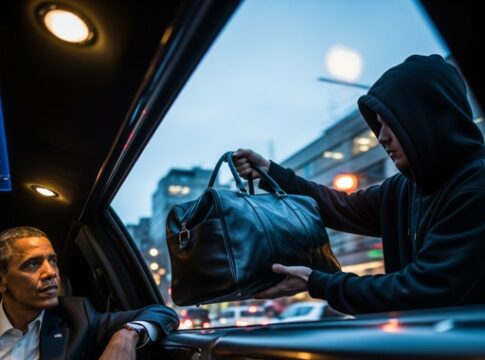A blockbuster federal trial has taken a stunning turn as Hollywood star Leonardo DiCaprio delivers unexpected testimony linking a massive foreign-influence scheme to former President Barack Obama’s 2012 campaign.
Celebrity, Campaign Cash, and the Law Collide
Pras Michel, a founding member of the Fugees, once ruled the charts with his genre-defining hip-hop hits. Today, he is behind bars, swept into a saga that exposed the porous borders of American politics and the reach of global money.
In 2012, Michel, flush with funds from Malaysian financier Jho Low, funneled millions into Barack Obama’s re-election campaign—illegally and surreptitiously. The courts have now spoken, sentencing Michel to 14 years in prison for his role in one of America’s most high-profile campaign finance violations.
Michel’s fall from platinum records to prison time did not happen overnight. Federal investigators unravelled a network of straw donors and secret meetings, tracing the money’s origins back to the infamous 1MDB scandal. Jho Low, now a fugitive reportedly hiding in China, allegedly used Michel as his conduit to American power.
The goal? Access, influence, and, perhaps most telling, a coveted photograph with President Obama. The DOJ argued that Michel’s actions went beyond ambition—they represented a betrayal of American sovereignty for personal and financial gain.
Inside the Courtroom: Unregistered Agents and Star Witnesses
The legal battle that unfolded in Washington, D.C. was anything but routine. Michel faced ten counts, including conspiracy and acting as an unregistered agent of a foreign government. The trial drew a parade of high-profile witnesses: Leonardo DiCaprio described lavish parties thrown by Jho Low, and former Attorney General Jeff Sessions testified on national security concerns.
The prosecution, emphasizing the breadth of Michel’s scheme, called for a life sentence. The defense countered that the guidelines were “absurdly high,” pushing for a three-year sentence and framing Michel as a pawn in a larger international game.
Judge Colleen Kollar-Kotelly, presiding over the case, ultimately handed down a 14-year sentence. Michel’s team immediately filed notice of appeal, arguing the trial’s fairness was compromised—including claims about generative AI used in defense strategy. As Michel sits in prison awaiting the next chapter, the case has become a touchstone for debates on campaign finance law, foreign agent regulations, and the evolving role of technology in the courtroom.
Ripple Effects: Politics, Pop Culture, and Prosecution
The implications of Michel’s conviction reverberate far beyond his own fate. The case shines a spotlight on vulnerabilities in U.S. campaign finance law, raising alarms about the ease with which foreign money can infiltrate the U.S. political system. For American conservatives, the story underscores a common-sense call for stronger enforcement and vigilance, especially as celebrities—with their wealth and connections—become gatekeepers to political influence. Michel’s downfall may serve as a deterrent for others tempted to skirt the law in pursuit of power or prestige.
For the entertainment industry, the episode is a cautionary tale: fame does not confer immunity, and reputational risks now loom larger than ever. Political campaigns, particularly in the wake of this scandal, may double down on compliance measures, wary of hidden hands behind large donations. Legal experts debate the appropriateness of Michel’s sentence and the precedent set by the use of AI in defense arguments, marking this case as a signpost for future prosecutions. As appeals proceed and the world awaits Jho Low’s fate, one thing remains clear—celebrity and money may open doors, but they cannot close the gates of justice.
Sources:
Los Angeles Times: Pras Michel Fugees sentenced Obama campaign donations


